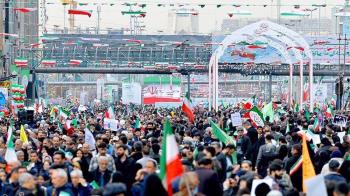Alwaght-Abdullah bin Abdulaziz, king of Saudi regime, received Sheikh Tamim bin Hamad, Emir of Qatar, at his palace in Jeddah Monday evening. During the meeting, they discussed cooperation between the two countries in addition to the overall events and developments in the Arab, Islamic and international arena. They have also discussed their differences over policy on the Syrian opposition, the Muslim Brotherhood and the government in Egypt, among other areas.
This is sheikh Tamim's second visit to Saudi during three last months. Abdullah and Sheikh Tamim earlier met in Jeddah on July 22, during which they reportedly discussed a way to reach a ceasefire agreement between Israel regime and Hamas in Gaza.
Qatar’s relations with Saudi, the Emirates and Bahrain sank to a new low in March when the three governments withdrew their ambassadors from Doha, accusing it of meddling in their affairs and supporting the Muslim.
Meanwhile, Emir of Kuwait, Sheikh Sabah Al-Ahmad Al-Jaber, met Shaikh Hamdan, Prince of Dubai. Kuwait tries to play the role of mediator among Persian Gulf Countries Council (PGCC) members. Kuwait that unlike UAE, Bahrain, and Saudi has refrained from any diplomatic measures against Qatar and has launched efforts to achieve reconciliation between Qatar and the rest.
Four following reasons can be considered as the roots of differences between Qatar and Saudi along with its allies.
1. Qatar support for Muslim Brotherhood and its allies throughout Mideast particularly in Egypt financially and by its TV channel, Al Jazeera.
2. Saudi regime's greed for domination over Arab countries in the Middle East. Saudi has repeatedly insisted on transforming Persian Gulf Cooperation into a Union. To transform a Council into a Union, some prerequisites are needed such as selecting a leader. Indeed, Al-Saud has raised such an idea to pursue its colonial policy through obtaining leadership of this Union.
3. Qatar-based Al Jazeera's disclosures against some Arab Monarchs in the region particularly Al Saud. For example, Al Jazeera broadcasted a debate on Saudi Arabia’s policy on the Palestinian question in 2002, shortly after the unveiling of a peace initiative for the Israeli-Palestinian conflict by King Abdullah, who was then the crown prince. The debate included fierce criticisms of Saudi ruling family, and Saudis, deeply offended and responded by withdrawing their ambassador from Qatar.
4. Al Saud has planned to engage Qatar in the regional crises including in Iraq and Syria. Saudi regime has stimulated Qatar to meddle in other countries internal affairs and to support terrorist groups that made numerous problems for Al Thani Monarchy and distorted their anti-terrorism reputation in the world. Accordingly, Sheikh Hamad handed power to his son Sheikh Tamim in order to compensate for the great loss they have suffered and escape Al Saud's trap set for them.
All abovementioned reasons led to deep-rooted disputes between Qatar and Saudi and consequently Saudi's allies. Accordingly, in the one hand, Al Saud has threatened to cut off Qatar's only land border, close its airspace to Qatari planes, and impose sanctions on Qatar. On the other hand, UAE, a close ally to Saudi regime, has threatened to blockade Qatar by air to force Al Thani to change its policies.



























